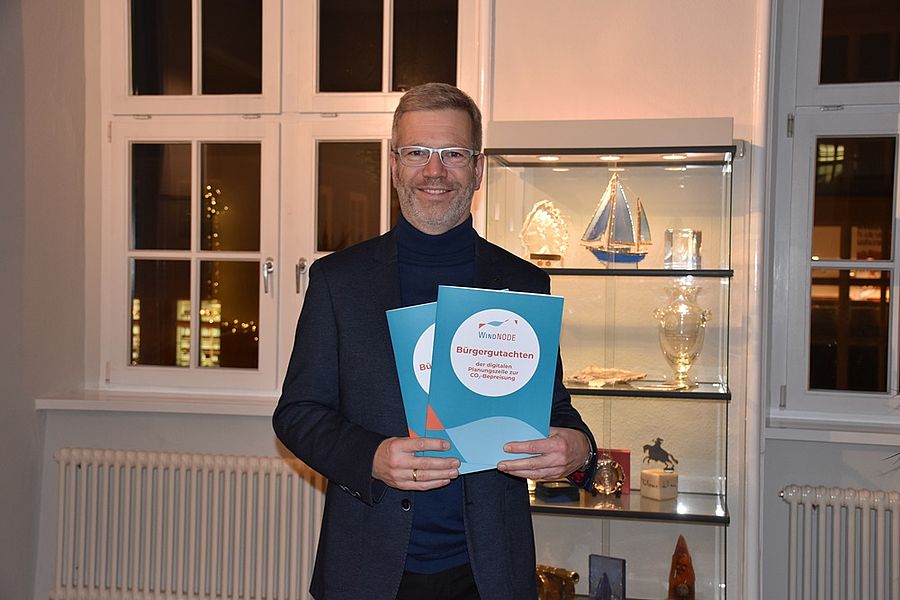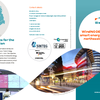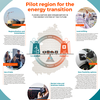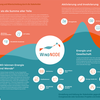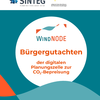On 15/12/2020, Dr Fassbinder, the mayor of Greifswald, received a citizen’s expertise on CO2 pricing at city hall. Due to the current restrictions of Covid 19, this was a virtual meeting in which the public participated via conference software. 29 participants took part in the meeting. The Technical University of Berlin, the WindNODE research project, the nexus institute, the city of Greifswald and the Institute for Climate Protection, Energy and Mobility (IKEM) were represented.
Dr Stefan Fassbinder, mayor of the University and Hanseatic City of Greifswald:
‘Only if we are able to cover our entire energy demand from renewable sources, will we be able to keep climate change under control? The cooperation of our citizens is a decisive prerequisite for this. The citizen’s expertise helps policymakers to reach the right decisions. I am honoured that our region was chosen for this study.’
Background
CO2 pricing means that a price is placed on the release of the greenhouse gas CO2, which was a “trivial offence” until recently, and furthermore regardless of where, by whom and to what end this greenhouse gas was released. Germany’s federal government decided such a CO2 pricing mechanism in its federal emission trade act (Bundesemissionshandelsgesetz, BEHG). As of January 2021, the release of one tonne of CO2 costs approximately 25 euros. This price is paid directly by fuel importers, of course, the consumers indirectly contribute as petrol, coal, gas and domestic fuel oil become more expensive as a result. This also makes products more expensive if a lot of CO2 was released during manufacturing.
This new climate policy instrument is merely the beginning. Many questions regarding the future amount, form and support of the pricing have been left unanswered wittingly by the federal government. Still, it is left unclear: how will this turn out? Is it useful or useless? Which parties are particularly impacted? Which accompanying measures are needed? Are we on board, or does it not go far enough for us? How important is climate protection to us? What are the regional effects?
21 citizens from Greifswald and the surrounding region discussed a pricing mechanism for CO2 emissions in 5 virtual meetings and prepared corresponding proposals.
Brief introductory lectures by experts in industry, traffic, habitation and energy were coordinated by Mr Jan Suchanek of the Technical University of Berlin. The planning cell to draw up the expertise was moderated by the nexus institute at WindNODE’s request.
The participants of the planning cell were randomly selected citizens of Greifswald and the surrounding area. This ensured that not only experts, not only city dwellers etc., had their say, but that each person committed to the cause was able to freely contribute.
Essential results (Jan Suchanek, TU Berlin)
- The approach taken by the federal government to price CO2 emissions is correct and important. Having said that, there must be reimbursements in order to make the resulting burden socially acceptable.
- With corresponding support, the participating citizens recommend a much higher CO2 pricing mechanism.
- Global and national climate policy such as CO2 pricing has a local and regional impact. Regional policymakers are urged to initiate corresponding support within the scope of their possibilities.
- This especially includes the expansion of storage technology, information and discussion with all parties involved and an environmentally sound reorientation of the traffic, building, water and consumption sectors, whilst considering the wants, needs, limits and possibilities of all those involved.
A technical milestone
The current global pandemic has forced us to hold all meetings virtually. This meant new terrain for Greifswald, nevertheless, a productive discourse with citizens is also possible in virtual form. That being said, the pandemic cannot divert our attention from the forever growing challenge climate change presents to humanity. In mutual consultation, we must find achievable solutions that are simultaneously practical at the regional level and responsible at the global level.
Download and further information
You can find the citizen’s expertise for download as well as the in-depth content of the meeting here.
Here, you can also consult the pages of the expertise online.
